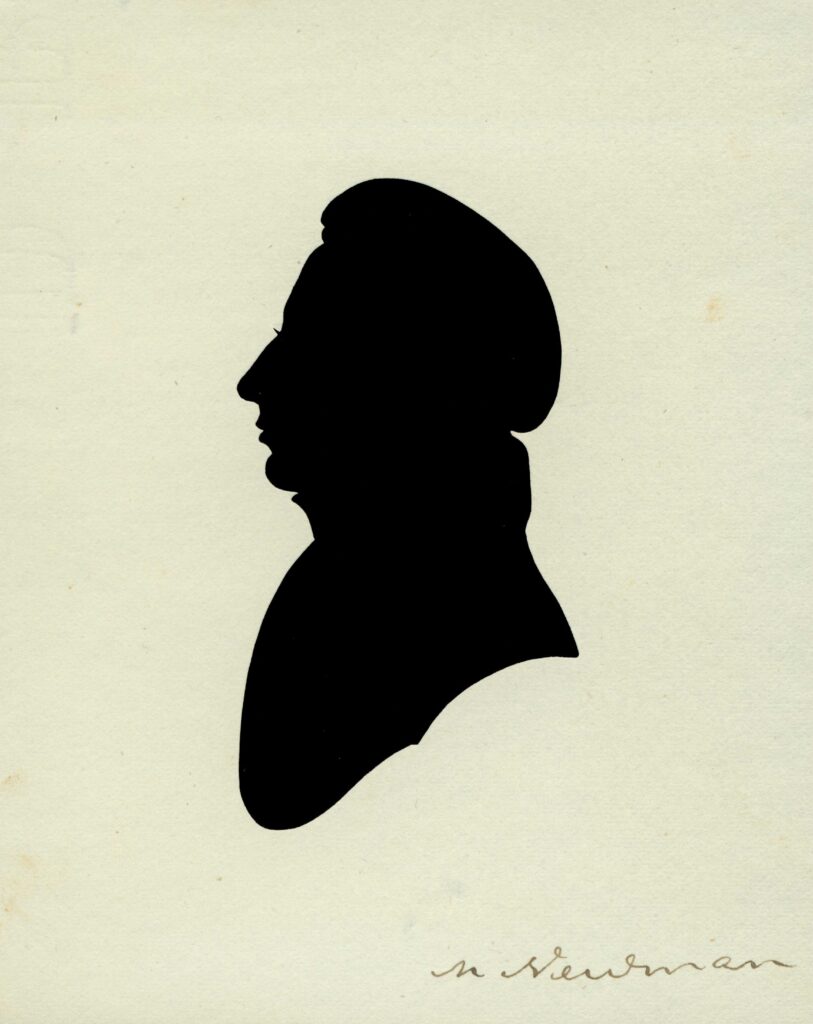
The Bane of Emily Dickinson’s Existence
Mark Haskell Newman was born in 1806 at Andover, Massachusetts. His father was a publisher and he had at least three siblings, Hannah, M. W., and Samuel Philipps. The latter brother became the Professor of Latin and Greek at Bowdoin in 1819. Samuel’s connection to Bowdoin was almost certainly why the Newman parents sent Mark to Bowdoin instead of a more local school. In fact, Mark was one of just two members of the Class of 1825 to come from Massachusetts.
Newman moved to Brunswick when he was just fifteen to begin his Bowdoin education. He spent his first year of college living at his brother Samuel’s house alongside classmate William Hale. Newman decided to join Bowdoin’s Athenean Society, a literary and social group where he found most of his friends. Sophomore year, the sixteen year old had the opportunity to break free of his family a little more. Instead of boarding with Samuel, Mark roomed in Maine Hall with an upperclassman. It is no coincidence that after Newman stopped living with his professor brother his name started to crop up among those fined for misbehavior at Bowdoin. He racked up consistent fines his sophomore, junior, and senior years for neglecting his work and missing prayers. Some of those forgotten essays were surely for Samuel, who was chosen as Bowdoin’s first Professor of Rhetoric and Oratory in 1824. One can only imagine the family dinners. Still, Newman was far from the worst of Bowdoin’s troublemakers. His most egregious offenses seem to be sneaking out of his room with fellow Athenean Jeremiah Dummer and skipping enough work that his bill was “converted” in 1824.
Newman continued to live in Maine Hall his junior and senior years and spent the lattter rooming with Cullen Sawtelle. He took some interest in his studies, as evidenced by his choice to take elective classes at the campus medical school. Still, Newman’s academic talents fell short of many of his peers. He was not asked to speak at any class exhibitions nor given a rank at commencement. He was probably an active participant in Horatio Bridge’s Navy Society, which consisted of unranked class members who partied when the rest of their peers practiced their graduation speeches.
Lacking the academic inclinations of his elder brother, Newman decided to make a career in business. After graduating Bowdoin, he moved to Amherst, Massachusetts, where he started selling books and renting horses to Amherst students. A few years later, Newman married a local woman named Mary Dickinson. In 1830, Mary and Mark celebrated the birth of their niece Emily Dickinson (yes, that Emily Dickinson). Soon after, the couple moved back to Andover where Newman joined his father at his publishing business. In 1831, Newman experienced a religious awakening that defined the rest of his life. Two years later, he and Mary welcomed their first child, Mark Haskell, Jr. The boy was quickly followed by four daughters: Catherine, Sarah, Clara and Anna.
In the late 1830’s, Newman decided to uproot his life yet again and moved his family to New York City. His rationale was that he could make more money there and then set more of it aside to give to Christian causes. He bought a house in Brooklyn and founded his own publishing company, which sold mostly textbooks. Though he disliked reading, Newman had a knack for knowing which books would sell. His company brought Newman the profit he sought, but the businessman never allowed himself to rest. While in New York chronic pain started to afflict him, but Newman never used it as an excuse to miss professional or social obligations. The older he got, the more effort he expended on causes he deemed pious.
The active life of the Newman family halted when both Mark and Mary caught tuberculosis in 1852. Mary died in March and her husband followed her in December. Even to the last day of his life Newman continued to work. He left the bulk of his considerable estate to educational and charitable causes like Bowdoin and the American Missionary Society. However, in Newman’s fervor to assuage his Christian duties he forgot to provide for his own children. He left all five of his progeny just $25,000. Newman’s four daughters, widowed sister, and complicated estate suddenly became the responsibly of Emily Dickinson’s father Edward. Edward was very unhappy with having to spontaneously provide for five more people. Emily was even more upset by the intrusion of her cousins. She found them too “pious” and wrote in a diary entry that “the Newmans seem very pleasant but they are not like us.” Of course, she soon got over her irritation and went on to become one of America’s most beloved poets.
Overall, Newman’s life was full of ironies. He was the brother of a professor, but a poor scholar. He hated reading but was brilliant at selling books. He was devoted to providing for missionary societies but forgot to will enough money to support his own children. Still, for all his flaws and paradoxes he was deeply loved and mourned. His brother M. W. wrote that, “he developed traits and character which greatly endeared him to us all,” and his friend the Reverend Dr. Badger said he was “a man of consistent character and piety, really benevolent, without display.” This was the legacy that Newman left behind.